|
...AND THE WINNERS ARE:
I prize:
|
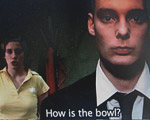 |
Kenji Ouellet,
Canada
Lesson 13, 2005. 11’ 00’’
The lesson is as emotional drama.
Kenji Oulet born in Canada and now based in Berlin.
Filmography includes dance, experimental films and
media concepts for contemporary choreographies. |
II prize:
|
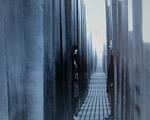 |
George Drivas,
Greece
Beta Test, 2005. 13’ 00’’
Today’s Berlin as a place of action for the Alfavile
sequel.
George Drivas received an M.A. in Film and Media
Studies at Freie Universitaet, Berlin and a B.A. in
Political Science at the University of Athens,
Greece. He is the recipient of numerous awards at
international Film Festivals. |
III prize:
|
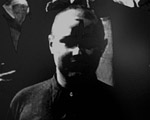 |
Jean-Gabriel Periot,
France
Even if she had been a criminal, 2006. 10’00’’
War and woman. 1944: they are tried because they
have stayed in enemies’ rear. Is it their fault?
Jean-Gabriel Periot is baby-sitter, barman, clothes
and handcraft salesman, videotapes program clerk,
assistant director, editor, mime, auction sales
assistant, journalist, dance filmmaker, artist…
|
|
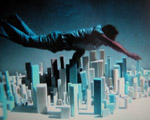
|
Erik Olofsen,
The Netherlands
In Places, 2004. 4’ 30’’
A man jumps from the sky. Amazingly he is safe and
sound. Cities soften a drop.
Erik Olofsen was born in Aalsmeer (The Netherlands)
in 1970. Graduated from Gerrit Ritevelde Academy
(Amsterdam) and now his works have been showing in
various countries. |
Jury special
prize:
|
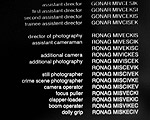
|
Goran Micevski,
Serbia
Endgame, 2005. 5’00’’
The true end is only beginning of the authorship
without end.
Goran Micevski is a photographer from Belgrade also
active in conceptual video and multimedia.
|
About Media Forum
For seven years Media Forum has brought new media art to the
Russian audience. It presented an avant-garde trend in the
works of artists, performers, video artists and
animation-makers experimenting with language, context and
techniques of electronic and digital mass media. This year
the Forum will also screen novelties and classics of both
Russian and world’s video art.
The programme was started in 2000 at an initiative of
Aleksei Isaev, a well-known Russian media artist, curator
and theorist of the new media, who founded and directed the
Moscow MediaArtLab Centre. Because of his untimely death in
March of this year we decided to dedicate this Media Forum
to his memory and realize his last idea – the Author(writ)y
theme.
“Contemporary screen culture finds opportunities for the
most rapid, clear and actual reflexion to changes or
alterations in viewer mentality. It defines this experience
as avant-garde and progressive. Newest tendencies of
contemporary culture connected with new technologies make it
possible for us to describe this part of culture as
possessing own content and audience. The audience is
attracted by communicational art model, which allows for the
viewers’ interactive participation in the art work dramatic
composition” (Aleksei Isaev)
AUTHOR(WRIT)Y. Drawing borders.
Media artist is by the way things are preordained to Author(writ)ative
authorship. First, as a creative individual who generates
own significant discourse and own rhetoric. The artist is
automatically put into opposition to totality: confronting
matter, audience, society, authority, time and space.
Authorizing his concept the artist stages a rhetoric fight
with the context. Only the charismatic, autonomous, despotic
rhetoric can break open the emptiness of distrust,
indifference and apathy. To assert one’s authority and
realize the art’s impact the artist flashes his will, power,
self-regard and ambitions. Under this aegis he storms heaven
and breaks away into the deep avant-garde. Only the
ambitious will own the future. (Viktor Miziano).
Second, he grasps the tentacles of authority – the media. He
manipulates its manipulators. Media are in themselves
rhetoric – with no execution of the authorship authority
they break away. When the artist rules them with a firm hand
he doubles the authority and creates art.
The VII Media Forum traditionally consists of the thematic
competition and individually curated programmes. They
present both fresh works and classics of world’s media art.
This wide range of works represents new screen technologies
and helps the audience adequately estimate the possibilities
of media technologies.
International board
Woody Vasulka – electronic art pioneer, founder of the
world’s largest media archives «Vasulkas», USA
Dr. Kirill Razlogov – MIFF art director, Russian Culture
Studies Institute director, Russia
Cathy Ray Hoffman – Cornerhouse Centre for Visual Arts
director, Manchester, UK
Etienn Sandrin - curator of the media art centre of Centre
Georges Pompidou, France
Jan Schuijren - curator, the Netherlands.
Programme
Competition programme
AUTHOR(WRIT)Y:
video art, TV art,
experimental film
180 works have been submitted for the 2006 competition –
from USA, France, Montenegro, UK, Germany, the Netherlands,
Canada, India, the Czech Republic, Russia, Ukraine, Belarus,
Japan, China, Azerbaijan, Australia, etc.
In these works the AUTHOR(WRIT)Y theme is prominent as both
the impersonal discourse of power in contemporary society
and social activism discourse using media as its means. Can
a media artist oppose the media absolute authoritarianism?
Is he turned into its instrument? What chances are there for
authorship rhetoric in the impersonalized discourse?
More >>>
Presentation programme
(retro screenings, special film and video screenings)
Vito Acconci’s films. Vito Acconci, an American video
art pioneer has through all his work researched the author
rhetoric theme by means of media (author’s collection,
«Electronic Art Intermix», New York). Author(writ)y
programme from the Centre Georges Pompidou collection.
France. Montevideo, the Netherlands. Videotage, Hong Kong.
Anthology, New York. MediaArtLab, Moscow. Vasulkas archives,
Santa Fe, USA. Art House In Shorts short films programme.
Something About Power Russian video art programme from the
State Centre for Contemporary Art. Freedom Territory British
video art programme. In Memory of Aleksei Isaev programme
etc.
|
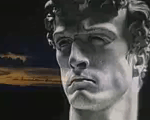 |
AUTHOR(WRIT)Y
Curated by: Konstantin Bokhorov.
Author(writ)y video programme from the Centre
Georges Pompidou collection. France. Montevideo, the
Netherlands. Videotage, Hong Kong. Anthology, New
York. MediaArtLab, Moscow. Vasulkas archives, Santa
Fe, USA.
The authorities’ impersonal discourse realized
through media and media use by contemporary artists
in their author rhetoric are the virtual problems of
avant-garde, later developed in video art. The
programme is based on MediaArtLab collection and
presents turning points of this development during
the last 30 years. These points can be called median
against media. |
|
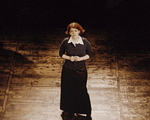 |
Art House In
Shorts. Main character’s view collection
Curated by: Tatiana Danilenko –
director, programme curator
Art house presupposes a special point of
view and position. It is close to lyric
poetry, where the author always makes
himself hear, even if he isn’t the narrator.
A film’s author sends his alter ego on a
world journey as a Main Character to live
trough different changes
declaring/demonstrating himself to the
world.
|
|
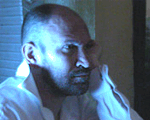 |
Aleksei
Isaev’s Virtual Attraction Fair
Curated by: Olga Shishko
Aleksei Isaev
Founder on the MediaArtLab information
and research centre. Media artisr, theotrist,
curator, editor-in-chief of View form the
East. Media consciousness/Media technology
and Media Art in Russia series. Member of
Russian Federation Cinematographers Union
(new screen technologies committee). Russian
Internet Academy member. Pro&Contra 2000
international symposium author and curator.
MIFF Media Forum programme director since
2000. Published a range of articles on media
and video art in Russia and abroad,
participated in various conferences, events
and festivals on video and media culture.
Videography
1992 Labyrinthology, video, Hi 8, 25
min.
1993 Topological Book Invariant, Betacam,12
min.(IBM 486: 3DS, AnimatorPro,Targa+)
Underground Land, Hi8, 7 min.(IBM 486:
3DS,AnimatorPro,Targa+)
1994 Videoscenario, Hi8, 7min. (IBM 486:
Animator Pro,Targa+)
Dance and Video, Hi8, 7min.(IBM 486:
AnimatorPro,Targa+) distribution "Coronado
film", France.
1995 New cannibals (Neyromancero), Hi8, 7
min, (Pentium 120, 3Ds4, Animator Pro, Adobe
Primer, MiroVideo) -distribution "Coronado
film", France.
1996 Assemblage of Attraction, (Sergei
Eisenstein Pavilion) Hi8 30min. Pentium 120,
3Ds4, Animator Pro, Adobe Primer, MiroVideo). |
|
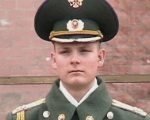 |
Something
About Power
Russian video art programme.
Curated by: Marina Koldobskaya, Maria
Korosteleva.
Every artist has something to say about
power, especially in Russia. Power changes
hands, our attitude towards authority
changes from acute hate and aversion to
acute desire to be accepted and participate.
Apart from political power, there’s the
power of money, body, desire, ideas and
objects. The elder have power over the
younger, men over women, bosses over
subordinates and vice versa. And maybe all
around there’s God. Everyone is entangled in
the cobweb of relationships which are to
some extent relationships of power. That’s
how widely the theme is interpreted by
programme’s curators. |
|
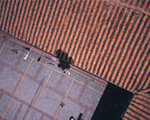
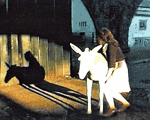 |
Freedom
Territory
British video art programme
Curated by: Elena Zaitseva
Art in our society is possibly the only
territory in which people’s yearning for
freedom is realized. In the global
performance society where TO BE is
transformed into CONSUME and PRETEND art
enables us to see the underlying meaning of
events while keeping aloof from ideology. A
major part here is played by art’s
appropriation of the spheres not originally
belonging to it such as mass media, public
space and everyday routine. This is where an
important humanitarian aspect of artistic
appropriation is revealed. It gives people
the much longed for “third way”, an
opportunity to break free from the system’s
stereotypes. Art working with appropriation
always makes people feel freer than before.
This is one of art’s most powerful magnets.
Due to it art remains one of the most
enchanting spheres of human activity despite
having rejected the function of aesthetic
pleasure. |
|
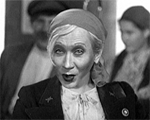 |
Feature Film
«Volga-Volga»
Vladislav Mamyshev-Monroe art project.
Directors: Andrei Silvestrov, Pavel Labazov
Andrei Silvestrov (film director, one of the
CINE PHANTOM club and festival founders)
presents VOLGA-VOLGA – the cult soviet
comedy of late 1930s directed by Grigory
Aleksandrov. This is a story of a gifted
village girl. Local bureaucrats try to
hinder her going to Moscow for a song
competition. The lead was played by Liubov
Orlova –the Russian Marlene Dietrich. This
is the strangest remake in the history of
cinema as the 1930s version has been
preserved completely, with the exception of
the leading actress. In this new version the
main character is played brilliantly by the
well-known Russian artist Vladislav Mamyshev-Monroe,
which gives the film an absolutely new
metaphysical sense. The world premiere of
the film took place at the 35th Rotterdam
International Film Festival as part of the
CINE FANTOM Day programme. |
Round table discussion
Leading media artists, journalists,
non-profit film directors, alternative cinema producers and
animation-makers are invited to join the round table
discussion. The author(writ)y of new media language and
various art strategies in working with them will be the
central topic of discussion. Oleg Kireev’s “Media Activist
Cook Book”, Shamanov’s “0 roubles” project and young art
festival “Stop! Who’s there?” (Darja Pyrkina) will be
presented along with other projects realized in 2005-2006.
Moderator — Nikolay Palazhchenko.
Multimedia show
1. BigFinn British group: Gold In the Age of Copper
Programme
2. NJ'ING by Oleg Kireev & DJ Osadchiy
3. Pop-group "Doors"
More >>>
|
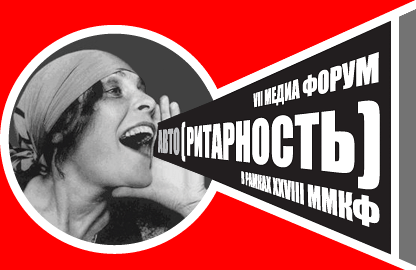
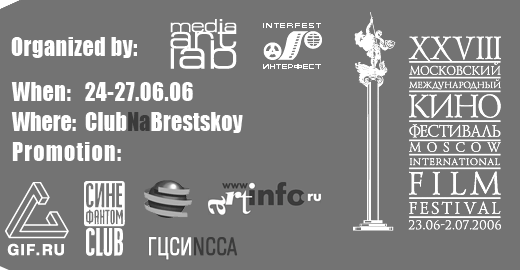
![]()